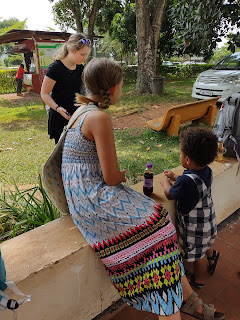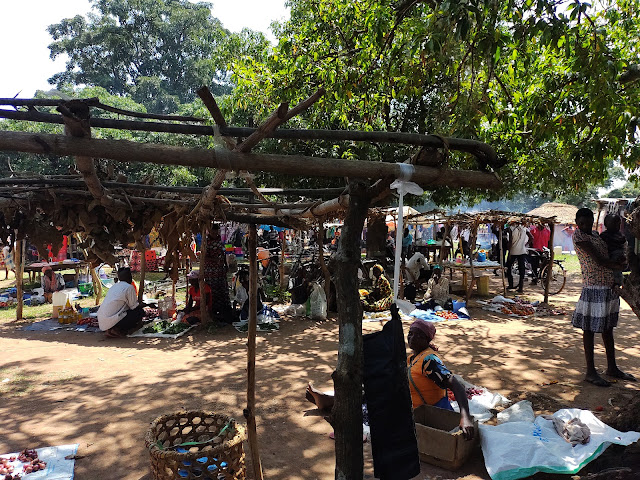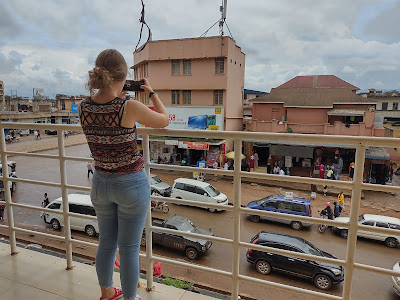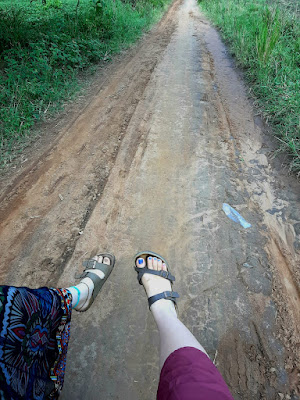Home
I love my home in Obule! Nearly every night, I fall asleep to the calming sound of crickets, frogs and bats singing their dark-time choir. In the morning, the song of tropical birds or children playing wakes me up. At times, silence reigns; other days, the sounds of boreholes (see below) pumping, children chasing each other, women chatting as they work, and the woosh of wind belch out an Obule chorus.
This post is dedicated to giving you a glimpse into my beloved home. Not every aspect is positive; some are annoying or painful. Yet to take out any of these parts abruptly would be to change the home I know. Yes, one can work on bettering oneself and encouraging those around to do the same. We often become so stuck in the cultural mindset surrounding us that we don't stop to question what is beneficial about the system and what, conversely, hurts people.
I conclude, then, that balance is needed. So needed! We need to examine the society we live in, decide what mindsets, practices and tendencies we agree with and those we do not. Don't become stuck in despair about what's wrong; it's so easy to become overwhelmed! Instead step away from that which doesn't align with your values, noting that such a process often takes baby steps, courage and ample time. Then MOVE ON. Embrace the beauty, kindness, uniqueness, comfort and strengths of home!
A little side note for those who don't know where home is for them... If you fit this category, maybe you feel a part of you belongs everywhere you've been. Or maybe you don't feel comfortable anywhere. Both are painful and tricky situations. As one who's felt both these things myself, I hurt for you. And I don't want you to stay in the pain. A good friend once told me, "let the pain visit, but don't let it overstay". Acknowledge the suckiness of your homelessness. Then appreciate how you've grown from this experience. Give thanks for places you enjoy visiting, even if they don't reach the level of home. Your life is an adventure, one that includes some not-so-great aspects, but nevertheless makes a breathtaking story that is uniquely yours.
OK, I've talked enough. Without further ado, welcome to Uganda...
Starting with an aspect that can be annoying :) Waiting. Restaurants can take over an hour to prepare food. Getting a SIM card includes waiting on the metal chairs in the dull office much longer than desirable. Weddings, burials, conferences... any gathering starts two hours after the designated time. For sure, it can frustrate you to no end- if you let it. However, I've had great laughs with my siblings and interesting conversations with my dad as we've waited. I've practiced being present by people-watching or tracing my breath. And obviously, waiting builds patience and acceptance for the result, the people and reality.
A section of Soroti, the town twenty minutes from us. This picture was taken from the plane as we flew in from the capital. Soroti is where we get our groceries, phone network and occasional dinner at a restaurant.
Our van :) Though it's given some hiccups to life (ei, not starting the day we were supposed to go on vacation), it's a part of our family, We've had this car for years; I dread the day it will be designated "too old". Until then, it's helped us take sick people to the hospital, conference attendees to their destination, or pick up a friend heading towards town.
The road from town to home. We turn at the mango tree in this picture, onto a small dirt road to get home.
Joy in celebration. Obule citizens know how to celebrate like no other! They beat drums, sing loudly, clap, make cultural calls, dance and jump. This picture was taken at the celebration of our arrival home after two years in the States.
Walking home, surrounded by community
When a guest arrives at a wedding or other celebration, they are often greeted with scarves or branches waved over their heads.
Makai and neighbor kids. How cute!
Greeting is ultra-important here. I love the emphasis on saying hello to a neighbor, vendor or stranger passed on the road. Not only must one say hello, but to neglect asking after another's health and home would be rude. How wonderful to stop and enquire after the wellbeing of others! They always appreciate when I greet them in Ateso!
Some local food: beans, cabbage, rice and potatoes.
Peanuts here are called ground nuts (g-nuts for short).
Gift-giving signifies someone's appreciation for a favor, visit or friendship. We've been extremely blessed to receive several chickens over the years! This was Makai's first experience accepting one :)
Most food here is salty, but never spicy. However, some families grow hot peppers for a member who enjoys spicing things up! As a little kid, I once played with hot peppers and paid the price with skin stinging from the plant's juices.
Staring here is far from rude! Kids who do not know us watch everything we do. A crowd of school children gathered to watch Makai's first attempt at pumping the borehole.
The boys room. We had to purchase bunkbeds from a local carpenter for Makai and Luka.
Bikes are a common mode of transport here, second only to walking.
Some neighbor boys. They love to play whatever sports the big kids organize, ride scooters on the cement around our house, practice their English with us and teach us Ateso.
The sun one degree above the equator is brilliant! (And hot!)
Buying avocados from a vendor on the street. Daddy graciously gets our produce whenever he goes into town to teach in the prison.
A local Saturday market. You can always expect vendors yelling for you to come, bargaining over prices, girls carrying food from the local "restaurant" to vendors, motorcycles driving around and, if you're a female, catcalling from the men.
A gentleman roasting maize (corn).
Our purchases: mangos, tomatoes, eggplant, roasted maize and a woven basket.
A gentleman making sandals from tires. They're extremely uncomfortable but have durability that trumps any other material.
Our neighbor, Johnathin, giving Makai a ride to church.
Our soccer field.
These smiles make my day!
I'm incredibly thankful for the unique perspective missionary kid life gives me. I'm able to understand those who feel out of place, to listen to other views, accept those who differ from me without fear, and speak a different voice into debates. It's come with its difficulties, but I'd never trade my life for any other.
A section in my beloved bookshelf. As a reader, I need to transport all my books from the States because we have no library here.
We make our own family traditions for special occasions. This July, my siblings bought masks and threw confetti over my head to celebrate my 19th birthday.
A window in the local school
I love nature! Both the simple and unique flowers never fail to stop me in my tracks.
A beautiful succulent bush.
Motorcycles are another popular form of transport. In any town or city, taxi motorcycles called boda-bodas line the streets, waiting for customers. My dad uses his motorcycle to go to teach in other villages or towns. Makai and Emalai love riding with him. Luka has begun learning how to drive it.
Our neighbors cook everything over fire. Their kitchen hut roofs are black from the smoke. Emalai and I started a little fire of our own one rainy day. She tried to roast marshmallows over it, not realizing we were using pinewood. Let's just say she didn't eat them :)
Playing football (soccer). We have a game going nearly every day.
Because the village is extremely community and clan oriented, children are often taken to live at relatives' houses if their parents pass away. This young boy, Ochan Denis, lives with our neighbor/pastor. Denis' father is in prison, where he met Jesus and attends Bible studies. We hope he can get out soon so Denis and his siblings (at other pastors' houses) might be reunited with their father.
These green bananas, called matoke (ma-toe-kae), will be boiled and mashed together, then eaten.
Another neighbor boy, Okello Jared. Jared's mom had him and his siblings by different men and is rarely at home. They live with their grandmother. Although in an impoverished situation, Jared has a beautiful smile and loves to be involved whenever a game is going on.
Makai thought this cut off barrel top would look good around our friend, Cathlene. :)
Typical shoes. Shoes are worn to school, church, special occasions and in the shower (so one's feet doesn't get muddy).
A typical hut. This one is a bedroom.
Beautiful!
Water flowing from the borehole spout into a jerrycan, the method of carrying water.
Hard work is required here to garden, clean and keep animals. We always dig with hoes (pictured).
Makai deciding which ball he likes best at a groceries store in the city.
The city of Mbale, two hours from our home. Mbale rests at the foot of Mount Elgon. Our family enjoys vacationing here for the view of the mountain, cooler weather, beautiful plants and available pools.
A shoe stall along the street.
Acacia trees have puffy yellow blossom and long, sharp thorns. Some believe Jesus' crown of thorns was made of acacia branches.
Cows hooked up to a plow
Tomatoes and beans prepared to cook at Youth Conference. Tomatoes and onions are base ingredients for nearly every soup. Every meal consists of a starch dipped into soup.
Monitoring the beans as they cook. No convenience food here! Beans must be sorted through (to take out the rocks and spoiled beans) then cook for a couple hours.
Mingling posho, a common starch which looks like hardened cream of wheats.
Plates ready for lunch at conference.
Told you staring is common! Life in the village is basically the same from day to day (which I love), so anything out of the ordinary attracts ton of attention. Above, Dad had a game of gaga ball going on in church for Youth Conference.
Little blessings pop up no matter where one goes! This mushroom elegantly stood in our backyard.
Emalai and Makai enjoying breakfast at our island.
Grace and baby Gift
A goat two days old. Animals are money here, used to pay a wife's dowry or sold in times when the family needs cash.
I love my friends here! This picture introduces you to a spunky lot of siblings: Kevin, Steven and Melvin. Kevin is actually the boy's cousin. However, here cousins are called sister or brother. Additionally, Kevin and her sister Lois came to live with our neighbors (their aunt and uncle) when their mother died. They've been a natural part of the family ever since!
Katie and Egles. Katie came to live with Egles' family for schooling reasons, kind of like an exchange student (only, there was not exchange made for Katie). She now remains with Egles' family, waiting for an opportunity to attend a tailoring course.
Grace and I goofing off as we walked to choir (photo taken by Grace)
Flipflops or other sandals are what we always wear here (unless you're Dad; he wears tennis shoes). (Photo taken by Grace)
A precious newborn
This is home. I know not how long I'll have the priveledge of staying here, but I'm enjoying each moment right now.




































































Comments
Post a Comment